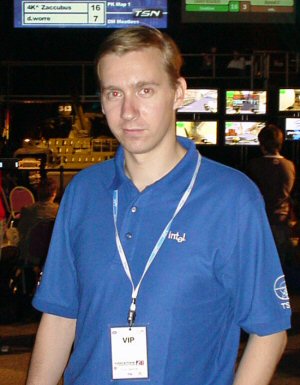Interview with Nick Knupffer, Intel
We sat down with Nick Knupffer, Public Relations Manager for Intel, and essentially the main man for this CPL event, to talk about Intel’s involvement in e-sports and how they see the future for e-sports.
HEXUS.gaming: So what’s the link between Intel and gaming or gamers?
Nick: Intel firmly believes that gamers will benefit from our latest Dual Core processors as gamers demand hugely powerful machines, which Intel has the CPUs to power. Pro-gaming is like the motorsport, the Formula 1, of our industry and Intel are providing the power the gamers need.
 Nick Knupffer, Dual to the core
Nick Knupffer, Dual to the coreHEXUS.gaming: Motorsport? Does this mean we’ll be seeing girls in skimpy costumes draped over PC in the near future? Oh wait, we get that any trade show…
Nick: Well, like motorsport, gamers play on machine at the cutting edge of technology and Intel is right there with the latest CPUs to help deliver the performance gamers need. But our Dual Core processors aren’t just for the pros, home and casual gamers will see a benefit from running a dual core system as in essence you’re getting two processors in your machine.
HEXUS.gaming:But how does having Dual Core actually help the gamer? Doesn’t the game have to be coded to take advantage of it?
Nick:Yes, games have to be written to make use of the second core and Intel have been working closely with many developers to help them produce games that will do this. The potential is immense though. Imagine the AI that you could encounter if one core is handling the game mechanics while the second core is dedicated to AI… Or the realism possible with devoting the second core to the physics? What developers can achieve is just amazing and the good thing is the technology is already there in the latest machines.
HEXUS.gaming: So if developers code their games to make use of dual core, does this mean we’ll see two versions of a game, a Dual Core one and a standard vanilla one?
Nick: No, the developer tools that Intel have made available allow developers to take advantage of a Dual Core CPU but if there isn’t one present the game will just run as normal. But there are advantages to Dual Core regardless of whether a game is coded for it or not there are advantages in having Dual Core in your machine. For example, you’re running Half Life 2 and Microsoft Anti-Spyware kicks in on a scheduled scan. Ordinarily this would slow everything up, but with Dual Core, without an extra software, the second core would be used for running the scan, letting you get on with trouble free gaming and the price of a Dual Core Intel CPU is very competitive as well.
HEXUS.gaming:Intel have been involved with pro-gaming for a while now, but we’ve got to ask, why? What’s in it for Intel?
Nick: Pro-gaming and e-sports in general are going to be huge and with Intel already being a household name, we want to use that name to promote e-sports in general. If you look at other sports, ultimately the ‘boss’ of the sport is the spectator. If no-one wants to watch a sport, it’ll just stay as a cult thing. E-sports are an ideal spectator sport… all we need to do is get it out there to a wider audience.
HEXUS.gaming: We hear that a lot, that e-sports are going to be big, but what is actually happening, how is it being promoted outside of the communities that already know about it?
Nick: That’s the tricky part. What we’ve done is taken a long hard look at other successful sports and looked at what makes them that way. The key thing is to make them accessible to the general public, to make it interesting and exciting. That’s one of the reasons we have the set-up on the stage for the TSN guys use… It shows that this is a sport that people can watch and cheer on for, just like football or motorsport. The real beauty is that this is a sport that anyone can take part in, you don’t need to spend hours on cross country runs or pump iron in the gym for six months, you do need to practise but practically any PC can run the games well enough to get playing and start competing.
HEXUS.gaming: So how will you reach a wider audience? What’s the ultimate aim?
Nick: It’s by sponsoring events like this and making it a professional. Smoothly run event that Intel and the other CPL sponsors hope to bring e-sports to the public. For example, the BBC are up here filming, which is great for CPL and you guys hit a wider online audience with your coverage too. The message we want to get across is that anyone can play these games. Yes, you need to practise but how many people would shy away from playing computer games and calling it training? This really is a sport for everyone. I think a true measure of e-sports finally becoming mainstream is to see a non-technical company sponsoring a team or an event. Imagine it, Team Redbull or The John Lewis CS Clan…









